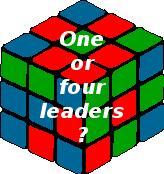
The development of leadership is comprised of several elements, that need to be clear beforehand.
The first element is a question:
“Are you sure about leading other people?”
That question should be asked, not because leading other people is the worst job there is, but because leading is more than giving orders from within a well defined plan communicated in the right way.
Leading means taking into account, that others stop taking responsibility for their actions, simply because the leader is responsible for everything.
- How do you make them understand, that they are responsible and need to take responsibility for what they do?
- How do you make those jealous ones let go of their jealousy?
- How do you make it clear, that being a leader, does not mean you stopped being a human and so you will make mistakes?
- How do you make them help you with their knowledge and information?
- How do you make them understand, that their way of working is no worse than yours or even better than yours?
- And that you do not posses all knowledge and skills just because you are the leader?
- How do you make them see, that it is not about being without fear, but that it is about conquering your fears and taking decisions or action although you are afraid?
- How do you convince them that your were chosen on basis of your merits and abilities and you were the best the decision makers could find for the job?
- How do you make it clear that a real leader does not lie to safe his position or protect his company?




